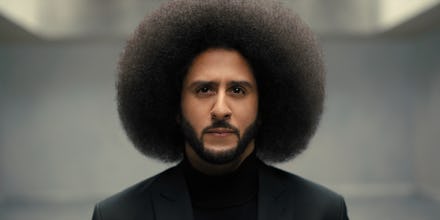Colin Kaepernick's new Netflix documentary highlights the man behind the icon

For the last five years, you can probably count on two hands the amount of times you've seen Colin Kaepernick make any public statements. On October 29, his Netflix limited series Colin in Black & White will be the first time he tells the world the story of the man whose identity has been lost in his iconography.
In the trailer for the Ava DuVernay co-created film, present-day Kaepernick discusses the coming-of-age transformation people undergo as they walk along their specific life path as a younger Kaepernick, played by Jaden Michael, is seen transitioning through numerous phases of his life. We watch younger Kaepernick go from aspiring star at Dutcher Middle School in Turlock, California to celebrated star quarterback at John H. Pitman High School, whose school Hall of Fame inducted Kaepernick in 2018. Throughout the montage, present-day Kaepernick extols the virtues of following your path to becoming who you're destined to be, even as outside forces attempt to fit your life in a predetermined box of what's acceptable. We've heard Kaepernick speak on these issues before, but the Black & White trailer is one of the first times his thoughts are more than words.
Without saying a word, young Kaepernick exhibits the identity issues and racial stratification he experienced as a biracial star athlete in high school. When present-day Kaepernick voices the belief we have when we're young that we're the masters of our destiny and able to define our lives however we see fit, we see younger Kaepernick enamored by someone's braided hair before walking through a door and donning those same braids. Soon after, we hear present-day Kaepernick remark, "we realize the game we play is someone else's," as a white male disapprovingly sneers at younger Kaepernick's new braids, causing his sullen disposition and transition back into his unbraided hairstyle. Younger Kaepernick goes from having a young Black girl as his love interest to being flanked by two white teens as Kaepernick's voiceover remarks on how it can feel like people's choices are dictated by those in power. In 90 seconds, one trailer touched on Kapernick's struggles with race, his identity being policed, and him having to choose between his authentic self and the version of himself that others want — all issues which seem to have informed his stance on racial justice and identity politics as an adult.
Netflix's synopsis of Black & White ends with the statement "you don’t know Kaepernick until you know Colin," highlighting how the series will use Colin's story to humanize him after the world has turned Kaepernick into a symbol of disruptive change and social justice. After Kaepernick began kneeling during the national anthem at NFL games to protest police brutality in America in 2016, he has largely remained stoically silent over the last five years, only doing a handful of interviews and speaking engagements. He declined to be interviewed for his November 2017 GQ cover story celebrating the magazine naming him "Citizen of the Year," but GQ editors noted "he has grown wise to the power of his silence." That power lies in precluding detractors from twisting his comments to fit their agenda by meticulously selecting what people know about him and when he'll tell them. That's why his most poignant public statements since he began kneeling came in his April 2018 acceptance speech for Amnesty International’s Ambassador of Conscience award, his narration of a September 2018 Nike ad about following your dreams when others deem them crazy, and a rare February 2020 USA Today interview about his upcoming memoir, in which he proclaims "who controls the narrative shapes the reality of how the world views society."
During these years, Kaepernick's silence has helped elevate him to status of civil rights activist, icon, and pariah. More than half of the people surveyed by The Seattle Times in 2020 attributed Kaepernick as being a catalyst for them to vote in a local or national election. Nike released an all black Kaepernick "Icon" jersey because he "leveraged the power of sport to help move the world forward," according to a Nike spokesperson speaking with The Undefeated. He was also the unspoken inspiration for the NFL to institute its first-ever rule requiring players to stand for the national anthem if they are on the field.
This is what happens when you change the world but don't tell them enough about yourself for them to change you. With Colin in Black & White, Kapernick, for the first time, is letting the world into the man behind the icon in order to inspire people with his story rather than simply his actions.